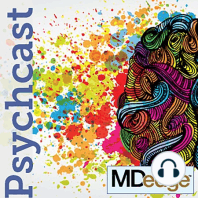23 min listen

Providing psychiatric consultation services for individuals living in nursing homes with Dr. Bradford L. Frank
FromPsychcast
Providing psychiatric consultation services for individuals living in nursing homes with Dr. Bradford L. Frank
FromPsychcast
ratings:
Length:
27 minutes
Released:
Jan 6, 2021
Format:
Podcast episode
Description
Bradford L. Frank, MD, MPH, MBA, conducts a Masterclass on how to provide nursing home consultations for psychiatrists. The documents Dr. Frank refers to during this Masterclass are available at (https://bit.ly/3rWqfcK) Dr. Frank is a board-certified geriatric psychiatrist who provides consultations for more than 30 nursing homes in North Dakota. He has no disclosures. Take-home points Dr. Frank reviews practical information about documentation, prescribing, and diagnoses for psychiatric clinicians who treat individuals living in nursing homes. The Centers for Medicare & Medicaid Services has many rules and regulations governing the psychiatric treatment of individuals in nursing homes, including special mental status testing, a policy of gradual dose reduction, and restrictions on how long certain medications can be used. Documentation Even for geriatric patients who live in nursing homes, a full past psychiatric history, including substance abuse and social history, is essential to diagnosis and treatment. To obtain these histories, Dr. Frank sends documents to the nursing home to be completed ahead of time, and then, while he starts to make his differential diagnoses, he talks with the nursing staff about why they want the consultation. The Brief Interview for Mental Status (BIMS) is a 15-item mental status exam mandated by the CMS during nursing home evaluations. A score of 13-15 indicates that a patient is cognitively intact, 8-12 indicates moderately impaired, and <8 is severe impairment. However, even patients with a BIMS score of 15 may still be diagnosed with moderate dementia when a more sensitive neuropsychiatric assessment is used. Patients should also complete a Patient Health Questionaire–9 and have labs done as they would in a clinic. The assessment must also address gradual dose reduction using language from the CMS (see below). Prescribing and medications Gradual dose reduction is a CMS policy defined as “the stepwise tapering of a dose to determine if symptoms, conditions, or risks can be managed by a lower dose or if the dose or medication can be discontinued.” In collaboration with nursing home staff, prescribers must attempt to taper the doses of psychotropic medications during at least two quarters during the first year of the prescription and at least annually thereafter. The Food and Drug Administration has provided a black-box warning for the use of atypical antipsychotics in geriatric patients with dementia, and their use in such patients is audited by the CMS. To avoid censure and low ratings, nursing home clinicians must prescribe antipsychotics only for psychotic symptoms, such as hallucinations and delusions, and not for “dementia” or “agitation.” As-needed (PRN) antipsychotic medications can only be used for 14 days, and to extend the period another 14 days, the patient must be evaluated in person by the primary prescriber. PRN medications from other drug classes, such as benzodiazepines, can be used for longer without an exam, but their timeline must be specifically documented. Psychiatrists are most commonly consulted in nursing homes for agitation, and antipsychotics are not supposed to be used solely for agitation. Dr. Frank recommends citalopram (maximum dose of 20 mg), then escitalopram, Nuedexta (dextromethorphan HBr and quinidine sulfate), and pimavanserin for agitation associated with Alzheimer's disease (AD). Diagnosis Research based on autopsy findings has concluded that mixed etiology dementia is the most common type of dementia. On autopsy, AD is concurrently found with either vascular dementia, as evidenced by cerebral infarcts, or Lewy body dementia. To use cognitive enhancers that are FDA approved only for AD, Dr. Frank will update the diagnosis to multiple etiologies with a severity specifier. Frank discusses that nursing homes are reimbursed at a higher rate for the diagnoses of restlessness and agitation (R45.1), noncompliance (Z91.19), and wandering (V40.31), and these
Released:
Jan 6, 2021
Format:
Podcast episode
Titles in the series (100)
Joseph Pierre: Dual Diagnoses part I: How do you treat patients with dual diagnoses. by Psychcast